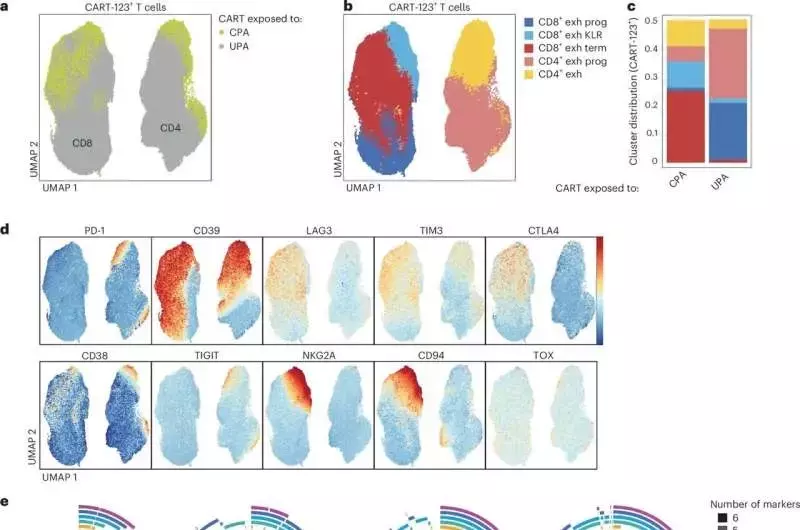Unlocking New Frontiers: Overcoming Cytokine-Driven Resistance in CAR T-Cell Therapy for Acute Myeloid Leukemia
In the relentless battle against cancer, the emergence of chimeric antigen receptor T-cell (CAR T) therapy has offered a glimmer of hope for patients with hematological malignancies. However, the translation of this revolutionary approach to the treatment of acute myeloid leukemia (AML) has proven to be a formidable challenge. A recent study published in Nature Medicine sheds light on the intricate interplay between cytokine signaling and the efficacy of CART-123 therapy, paving the way for innovative combination strategies that could unlock new frontiers in the fight against this aggressive form of leukemia.Unleashing the Power of CAR T-Cells: A Promising Approach Faces Unexpected Hurdles
Harnessing the Immune System's Might: The Promise of CAR T-Cell Therapy
CAR T-cell therapy has emerged as a groundbreaking approach in the treatment of various hematological malignancies, demonstrating remarkable success in tackling B-cell cancers. This innovative therapy harnesses the power of a patient's own T-cells, engineering them to recognize and eliminate cancer cells expressing specific antigens. By reprogramming these cells to target and destroy the malignant cells, CAR T-cell therapy has offered a glimmer of hope for patients with otherwise limited treatment options.Navigating the Challenges of AML: The Elusive Quest for Effective Immunotherapy
The translation of this success to the realm of acute myeloid leukemia, however, has proven to be a formidable challenge. AML, an aggressive form of blood cancer, has historically been resistant to conventional therapies, leaving patients with limited treatment options and poor prognoses. Researchers have long recognized the potential of targeting the CD123 antigen, which is frequently expressed on AML cells, as a promising avenue for immunotherapy. The development of CART-123, a CAR T-cell therapy specifically designed to target this antigen, held the promise of a breakthrough in the treatment of relapsed or refractory AML.Cytokine-Driven Resistance: A Roadblock in the Path to Success
The recent study published in Nature Medicine sheds light on a critical obstacle that has hindered the success of CART-123 therapy in AML. The researchers found that the exposure of AML cells to certain cytokines, such as IL-3, GM-CSF, and FLT3L, resulted in the exhaustion and diminished efficacy of the CART-123 cells. These myeloid-supportive cytokines, which are known to contribute to AML chemoresistance, essentially reduced the susceptibility of AML cells to the specifically engineered CART-123 cells, undermining the therapy's effectiveness.Unraveling the Cytokine Conundrum: Insights from the Study
The study's findings revealed a previously unrecognized challenge in the application of CAR T-cell therapy for AML. The researchers observed that the secretion of these myeloid-supporting cytokines during the CART-123 treatment promoted the survival and proliferation of AML blasts, effectively counteracting the targeted attack of the engineered T-cells. This cytokine-driven resistance mechanism highlighted a critical blind spot in previous AML-directed immunotherapy studies, underscoring the need for a more comprehensive understanding of the complex interplay between the immune system and the tumor microenvironment in myeloid malignancies.Combination Therapy: A Promising Path Forward
Recognizing the pivotal role of cytokine signaling in undermining the efficacy of CART-123 therapy, the researchers explored a potential solution. By combining the CART-123 treatment with the JAK1/2 inhibitor ruxolitinib, which blocks the JAK/STAT signaling pathway, they were able to restore the sensitivity of AML cells to the engineered T-cells. This combination approach effectively neutralized the cytokine-mediated resistance, paving the way for enhanced treatment outcomes.The researchers' findings suggest that this cytokine-driven resistance mechanism may not be limited to CART-123 therapy alone, but could potentially undermine the efficacy of other immunotherapy methods targeting myeloid malignancies. This realization underscores the importance of a comprehensive understanding of the complex tumor microenvironment and the need for innovative combination strategies to overcome these challenges.Unlocking New Frontiers: The Path Ahead
The insights gained from this study have the potential to reshape the landscape of AML treatment, offering a glimmer of hope for patients with relapsed or refractory disease. By unraveling the intricate interplay between cytokine signaling and the efficacy of CAR T-cell therapy, the researchers have paved the way for the development of more effective combination therapies that could unlock new frontiers in the fight against this aggressive form of leukemia.As the field of cancer immunotherapy continues to evolve, the lessons learned from this study serve as a powerful reminder of the importance of a holistic approach to understanding and addressing the complex challenges that arise in the treatment of myeloid malignancies. By embracing this newfound knowledge and leveraging innovative combination strategies, the medical community can strive to deliver more effective and durable outcomes for patients battling acute myeloid leukemia.

